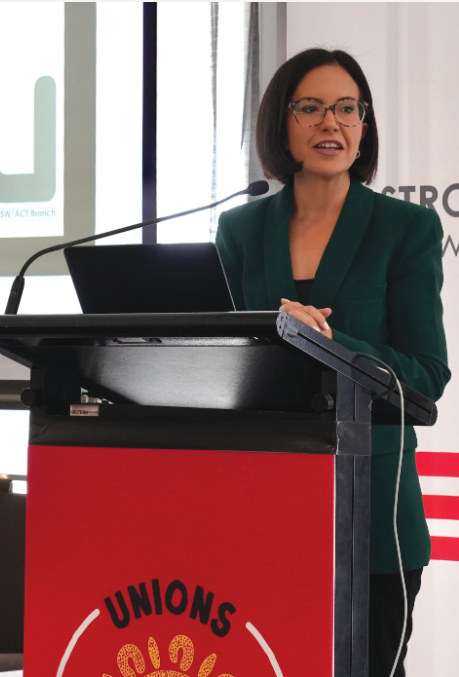
Listening to the voice of teacher union members is important to her government, NSW Deputy Premier and Minister for Education and Early Childhood Learning Prue Car told IEU Council on 17 June, Sue Osborne writes.
Prior to Council, Car had met with IEU delegates during a visit to State Parliament earlier in June.
Minister Car told IEU Council delegates that there were no quick fixes to problems in the teaching profession without addressing wages and workload.
The “wide scope” of IEU membership meant the IEU was important to her government when it was seeking answers to the structural challenges facing education.
“Teachers have been screaming at previous governments to at least listen to them. I am proud to say I want to be an education minister for all schools and all students,” Car said.
“Education is a joint responsibility we all share. I think if we can work together towards a common goal, we can achieve a lot.”
She flagged major reforms that would get to “the root of the problem”. She acknowledged the teacher shortage, which she said had been “wrongly and consistently denied” by the previous government.
Improvements to public sector wages, including government school teachers, will be announced soon, and would improve the IEU’s ability to negotiate for its members, she said.
Cutting workload
Car said she was constantly asked about workload issues when she visited schools and there was a pressing need to “relieve unnecessary compliance”.
“The accumulation that has occurred over the years of this extra impost on teachers and other staff is just unacceptable.
“It has resulted in an ongoing erosion of time available to focus on the core teaching and learning of our children, including student assessment and feedback.”
The government school sector is undertaking an audit of its compliance and documentation, and she urged independent and Catholic employers to do the same. She praised the union’s efforts to reduce compliance though its work on Nationally Consistent Collection of Data (NCCD) and its recent poster on NESA compliance (see p10).
Her government would also work in close consultation with teachers on the rollout of the new curriculum.
Initial teacher education
Calls to reduce initial teacher training as a quick fix to shortages were “unconscionable and short-sighted.”.
Next month’s national meeting of education ministers should support redesigning of teacher education courses to better prepare for the practice of teaching.
“It is clear to me that we need better partnerships. This is not achieved by just slashing teacher training time, but by designing programs that might better address both the intellectual and practice components of your profession.”
Early learning
As Minister for Early Learning, Car said she had a passionate interest in this area. “I hold it to be so important for the life chances for so many of our young people, especially the most vulnerable”.
She said it is a complex, challenging area to negotiate in, but said it is good that early childhood teachers are recognised as equal partners in the teaching profession through common accreditation.
She acknowledged the new approach the IEU is taking in tandem with the AEU Victorian Branch and the United Workers Union for bargaining with employer groups (see p7).
Car finished her address saying she looked forward to “continuing to engage meaningfully with your union and your members in the development of the government’s agenda and the implementation of policy.
“We will work together to achieve these outcomes. I’m so grateful for what you have done thus far. I can’t wait to work with you into the future.”
Questions from floor
The Minister allowed a generous amount of time for questions from IEU delegates which canvassed issues such as resources, more support for early career teachers and access to PD (she said “the days of PD being used as a political football are over” – advice from NESA would be forthcoming).
She encouraged teachers to approach her with any suggestions or solutions.



































































































































